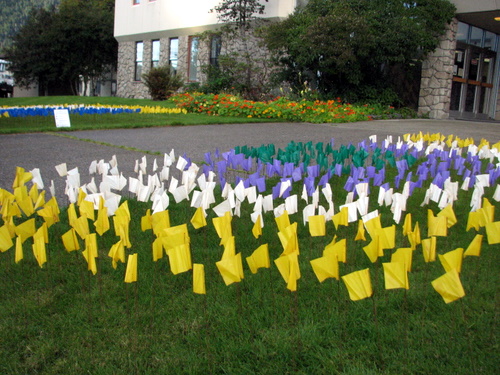
The Sitka Domestic Violence Task Force has installed flags on the courthouse lawn to represent the annual impact of DV in Sitka.
October is Domestic Violence Awareness Month. The local domestic violence task force — and even Governor Sean Parnell — are maintaining a full-court press to keep the problem in the public eye.
Parnell wasn’t in Sitka specifically to talk about domestic violence, but the Choose Respect campaign has become his signature social issue. Speaking to the Sitka Chamber of Commerce in the middle of a federal government shutdown, as his administration begins to piece together a state budget for next year, the governor said he appreciated the town’s participation in Choose Respect.
“And somebody who is experiencing domestic violence sees the newscast of you on tv, or sees the pictures of you gathered. They then call their domestic violence shelter, because they know that this is not normal. They don’t have to bear this as their normal. And that you actually care enough to step forward for an hour of your lunchtime and march, to do something about it.”
Choose Respect began in 2010 with 18 Alaskan communities and has grown to 150. The event is held on the last day of March. “Building awareness” sounds cliche around any social issue, but Parnell sees it as a real tool for reversing what he describes as an epidemic.
“We’ve raised awareness now so that people have permission to speak. We’ve given them cultural permission to speak. So when you’re out with your buddies on a deer hunt or a moose hunt, it’s okay to ask how things are going at home. And if you sense something’s wrong there, bring it out, speak it out, and say you care about them enough to get them help if they’re willing to come with you. That’s what we’ve done: We’ve given them permission to speak about these unspeakable things.”
“Domestic violence calls are one of the calls we go on the most. And it’s also one of the most dangerous calls that we go on,” says Sitka police chief Sheldon Schmitt.
On the courthouse lawn this week there are 157 blue flags representing police calls. There are over 500 yellow flags representing “crisis calls.” 130 flags for the women who have spent a night at Sitka’s domestic violence shelter, and 89 green flags for the children who have accompanied them.
Police are the first responders in a domestic violence call. Schmitt says that starts a chain of events.
“First thing we’re going to do is to try to calm the situation and determine if a crime has been committed. And if a crime has been committed, then we’re mandated to make an arrest.”
Elisabeth Schafer is the victim/witness paralegal in the district attorney’s office in Sitka.
“Prosecuting domestic violence is complicated because it involves people who love each other, who have a history together. They’re not strangers. They have children. When he isn’t using, or she isn’t using, or drinking, they’re a wonderful mother, wife, husband, or father. They have good times. So it becomes very, very hard, but still their hope is to get back together and mend this relationship, and to have a healthy relationship.”
Schafer is busier than she should be in a place like Sitka. Victims of domestic violence may have injuries that need medical attention. Sometimes the injuries are not physical at all.
“They come after a time of great shock. They’ve not had much sleep. They’re worried about their children, about finances, about housing, their job, child care.”
Schafer says the state is obligated to prosecute domestic violence cases, if there’s evidence of a crime — even if people want to get back together. She says sentencing sometimes involves coursework that can help defendants change their pattern of behavior.
Gov. Parnell takes credit for helping create the law that compels the state to prosecute domestic violence crimes. He was a young legislator in the 1990s in Anchorage, and took ride-alongs with police. 65-percent of the calls were for domestic violence.
“So I had those moments where I went into the home with the officer while he talked the woman and her children out of the closet, where they were hiding in fear. The perpetrator had left, once she’d called the police. I had the experience of seeing the tragic results of domestic violence at that time, and it became more real and more personal to me.”
Parnell helped pass the Domestic Violence Prevention Act of 1996 when he realized there was no standard for prosecution in the state. It didn’t cure the problem. As governor, he thinks the stakes have grown even higher.
“I think this is a cancer that is eating us from the inside. And unless we are willing to take action as individual Alaskans, and collectively as Alaskans, the economy’s not going to matter. If we have people that can’t function at school or at work because of these issues. So, that’s our challenge as Alaskans: to bring it into the open, get people the help they need, and help heal the wounded.”
The flags on the courthouse lawn in Sitka will remain in place for about a week.































